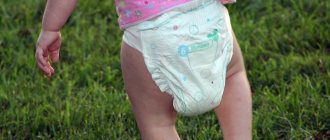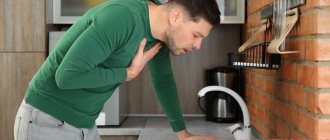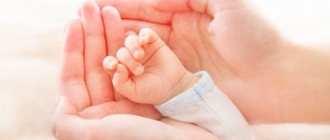Almost every person has experienced discomfort associated with intestinal dysfunction. And one of the most common pathological conditions is diarrhea. It manifests itself in an increase in the number of bowel movements and changes in the quality and color of stool.
Often serves as a sign of intestinal infections caused by harmful microorganisms (viruses, bacteria). Therefore, it is very important if loose stools appear in time to contact specialists who will identify the cause of this condition.
Diarrhea is also dangerous because this process contributes to dehydration of the body, which can lead to disturbances in water-electrolyte balance. Timely therapy will help not only get rid of unpleasant symptoms, but also prevent unwanted and even dangerous consequences.
What can cause loose stools?
Loose stools appear due to damage to the digestive organs.
Common causes are microorganisms that attack the digestive organs.
These are: salmonella, dysentery bacilli, entero- and rotaviruses and other pathogens. Children are prone to infection with Giardia, which causes giardiasis.
Food poisoning that occurs as a result of eating poor-quality food that has expired or has violated storage conditions is very common. Worm infestations, which are characterized by pain in the umbilical region, loss of interest in food or vomiting.
Ulcerative colitis may also be accompanied by blood-streaked diarrhea. This disease is non-infectious in nature and manifests itself in damage to the intestinal mucosa, as a result of which ulcers form on its walls.
Children sometimes experience symptoms of irritable bowel disease, which also leads to thinning of the stool. Changes in stool can also be affected by stressful situations, which result in changes in both the psycho-emotional background and physical state.
Causes of diarrhea (diarrhea)
Diarrhea in most cases is caused by the following reasons:
- eating disorder
. Diarrhea can occur as a result of overeating, abuse of fatty and sweet foods, or an excess of vegetables and fruits in the diet. Unusual cooking or eating incompatible foods can also cause diarrhea;
- intestinal infections, food poisoning
. In this case, as a rule, diarrhea is accompanied by abdominal pain and often vomiting. Your temperature may rise;
- intestinal dysbiosis
. Digestion of food in our body is carried out with the help of special bacteria. Disturbance of the microflora in the intestines (for example, as a result of the use of antibacterial drugs) leads to stool disorder. With dysbacteriosis, bursting pain in the abdomen, intensifying in the evening, and flatulence (excessive accumulation of gases in the digestive tract) are also observed. There may be skin manifestations in the form of various rashes;
- inflammatory bowel diseases
(colitis, Crohn's disease, ulcerative colitis);
- intestinal parasites
(worms, lamblia and some others);
- food allergy
;
- enzyme deficiency
(lactose deficiency in infants, pancreatitis, mucoviscytosis and other diseases);
- vitamin deficiency
;
- hormonal disorders
;
- irritable bowel syndrome
, in which stool disorder occurs in response to psychosomatic stimuli (for example, to exciting life situations - the so-called “bear disease”). Severe stress can also lead to intestinal dysfunction.
- Stool disorder is often observed with ARVI. In this case, diarrhea accompanies the catarrhal symptoms typical of ARVI.
Infants suffer especially often from bowel disorders. Their body reacts in a similar way to almost any irritant (changes in food, infection, teething, emotional stress, etc.).
Diarrhea in babies.
Diarrhea in babies is not always a dangerous symptom.
For children under 1 year of age, unformed and unsolid feces are normal. This is facilitated by specific nutrition (mother's milk and formula), as well as the imperfection of the children's digestive system.
However, if blood, foam, mucus is visible in the baby's stool, or the discharge becomes watery, then this may be an alarming signal. In these cases, you need to contact a specialist.
Normally, the stool of children under one year of age should be yellowish in color and have a sour smell; whitish lumps are allowed in the stool. Emptying, as a rule, occurs 6-7 times a day. And upon reaching one year of age, the norm becomes emptying from 1 to 3 times a day. At the same time, ordinary soft stools should not be a cause for concern.
Treatment of loose stools
Diarrhea every day, the causes of which have already been established, is treated in accordance with them. In addition, for all types of diarrhea, symptomatic therapy is prescribed to eliminate or reduce the severity of painful manifestations.
Fighting dehydration
Regardless of the cause, diarrhea every day always leads to the loss of fluid and salts in the stool. To prevent and treat dehydration in the initial stages, oral rehydration is used - taking a large amount of liquid (2-3 liters per day) in fractions, that is, in small sips every 2 minutes. Fractional intake is necessary in order to avoid vomiting due to overdistension of the stomach with a large amount of water.
For oral rehydration, boiled water, non-carbonated mineral water, dried fruit compote, weak sweet tea, and special glucose-salt solutions are used.
In severe cases, when the patient’s condition does not allow him to take liquid by mouth (lack of consciousness or repeated intractable vomiting), dehydration is combated with the help of intravenous drip administration of saline and glucose-saline solutions.
Diet
Just as some foods can weaken and cause loose stools every day, others can have a strengthening effect on the intestines. These include, first of all, rice and rice water, jelly, mashed potatoes, as well as pasta, some berries, fruits (bird cherry, blueberry, chokeberry) and their decoctions, decoction of the peel and partitions of pomegranate. It is necessary to avoid eating fatty, fried, spicy and smoked foods, which create excessive stress on the gastrointestinal tract and can themselves cause diarrhea.
Taking medications
Medicines are prescribed in strict accordance with the causes of diarrhea:
- for infectious diarrhea, antiviral and antimicrobial drugs are used;
- for diseases of the gastrointestinal tract, enzymes are used;
- for infections and poisoning, sorbents are prescribed;
- for most types of diarrhea, IMODIUM® Express can be taken as part of complex therapy.
IMODIUM® Express slows down intestinal motility, which contributes to more frequent bowel movements, suppresses the release of fluid and salts into the intestinal lumen, reducing the volume of feces, loss of salts and water. The drug IMODIUM® Express should be used in strict accordance with the instructions, taking into account possible contraindications.
Up to contents
What should you do if your child has abnormal stool?
Smecta is an excellent remedy for diarrhea.
The most important thing is to never resort to self-medication, as it can only worsen the situation.
It is urgently necessary to call a doctor to your home, who will make an initial diagnosis and give the necessary recommendations. Mothers need to know that if their baby has diarrhea, they should not stop feeding for more than two days.
A child, like an adult, needs nutrition even in this state. However, foods that cause fermentation processes in the intestines should be excluded from the diet.
Reasons for appearance
Brown diarrhea can be caused by the following factors.
| Intestinal infections. | Abnormal bowel movements are caused by viruses or pathogenic bacteria that have entered the body. |
| Poisoning. | Eating unwashed fruits and vegetables, spoiled food, and low-quality alcoholic beverages can cause diarrhea. |
| Food allergies. | Use of certain medications. |
| Chronic and acute liver pathologies. | Liquid light brown stool can be a symptom of cholestasis (insufficient bile secretion), pancreatitis, hepatitis, cirrhosis. |
| Eating certain foods. | Indigestion and brown diarrhea are often caused by the following foods: blood sausage, prunes, blueberries, black currants, beets, large amounts of coffee. |
| Use of certain medications. | Diarrhea can be caused by medications that contain iron and bismuth. With their long-term use, beneficial intestinal microflora is suppressed. |
When should you see a doctor for diarrhea?
You should consult a doctor if you have diarrhea lasting more than two days, fever up to 38.8˚C or more, frequent vomiting, six or more episodes of bowel dysfunction during the day, severe abdominal pain, blood or pus in the stool, tarry stools , symptoms of dehydration (extreme thirst, rare urination with a small volume of urine, dark urine color change, severe general weakness, lethargy, dry mouth, decreased blood pressure; crying without tears in babies, sunken eyes, fontanel). It is especially important for older people and people with weakened immune systems to get timely help.
The need to seek medical help for diarrhea can be clarified here.
Based on your individual situation, symptoms, general health, diagnostic results, the doctor will prescribe the necessary treatment. It may include means for rehydration, restoration of electrolyte balance; medications aimed at eliminating symptoms (enterosorbents, drugs for regulating intestinal motility) or the underlying disease causing diarrhea; treatment of infection (antibiotics, antiparasitic drugs); nutritional recommendations.
Partial protection against diarrhea caused by rotavirus infection in early childhood is provided by the appropriate vaccine. Methods to prevent traveler's diarrhea include hand washing, careful food selection, and using bottled or purified water for drinking, brushing teeth, and making ice.
Necessary measures
| You should not self-medicate. If diarrhea occurs, you should consult a doctor. He will conduct a diagnosis and, based on its results, select the optimal treatment. |
Of primary importance in the treatment of brown diarrhea is correction of the diet and restoration of water balance.
| Until your stool normalizes, you will have to give up fresh vegetables and fruits, juices, dairy products, rough and fatty foods, smoked and fried foods, canned food and marinades, black bread and fresh white bread, and baked goods. | It is allowed to eat steamed vegetables, porridge cooked in water, dietary meat, white crackers, strong tea, and St. John's wort decoction. |
To prevent dehydration, you need to drink at least two liters of fluid throughout the day. After each bowel movement, it is recommended to drink half a glass of water. Electrolyte solutions will help retain fluid in the body.
Antibiotics are usually not used for this form of diarrhea, but this issue is always discussed with a specialist.










